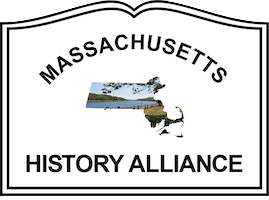The following is an open response to Peter Feinman’s blog post of July 29, entitled: History Advocacy: Lessons from the Massachusetts History Alliance Conference.
As a history professional working in Massachusetts, a member of the Massachusetts History Alliance Board of Directors and chair of its Advocacy Committee, I regularly read your essays and applaud your efforts to investigate and report on regional activities that impact history organizations.
It was with genuine excitement that I sat down to read your recent blog post, “History Advocacy: Lessons from the Massachusetts History Alliance Conference.” I’d like to take this opportunity to respond to your somewhat dismissive assessment of the conference as a whole and your critique of the session you attended.
First of all, thank you for attending the conference. While it has co-sponsored conferences in the past, the Mass History Alliance is a relatively young organization that is wholly volunteer-driven. We are working to define our purpose and to assess the needs of local history organizations in Massachusetts. As a collaborative clearinghouse for resources and information, we have developed the infrastructure for a robust web presence that can make tools, opportunities, partnership models, empowering stories and a range of other resources freely accessible to all.
The session that you attended at the conference reflects this practical approach. It was intended to provide useful information that might assist individuals representing their organizations. You observed, “the session was entirely geared towards individual people representing individual organizations advocating for individual items on behalf of the individual organization.”
I understand that you had hoped to see that the MHA had progressed quickly towards becoming a “statewide organization [that can] arrange for a history advocacy day in support of statewide history concerns.” We still have a long way to go until we can operate effectively as a voice for history at the statewide level.
The advocacy session might have been better, and we are striving to make everything we do better. However, contrary to your observation, I believe the session had everything to do with “what the history community really needs.” Creating a shared voice and a shared vision out of the many members of the MHA is the first step to becoming a strong and purposeful voice for the hundreds of mom & pop museums, archives and societies spread across our state, struggling to keep their doors open and their programs running. Our intent is to inspire and empower them to hold on, to thrive and to grow. We cannot hold a “history advocacy day” until we have a clear and cogent message that comes directly from our membership and speaks to its vision and its needs. We are in the early stages of learning from our members about the specific challenges they face and the support and resources they need to survive and flourish. In the meantime, our advocacy session was organized with individuals working alone or in small groups all over the Commonwealth who might benefit from insider tips on approaching representatives.
As you noted, ‘the history community does not do a good job advocating for itself,” and I agree with you. The Mass History Alliance aspires to be an umbrella organization, a convener and a clearinghouse for support and collegiality, but there is much work to be done. We need to expand our membership, gain trust and legitimacy through our programs and refine our advocacy efforts. Your agenda for public history projects in need of advocacy for is spot on.
The MHA aims to become a voice for the history community, but first it must learn from and listen to that community.
Grassroots efforts may be slow but we have seen great progress. In the midst of your critique and concerns, you may have missed the overall success of the 2019 Mass History Alliance Conference. 237 participants representing over 150 organizations attended. We came close to surpassing all previous attendance rates and we welcomed representatives from more organizations than ever before.
Moreover, there was a palpable sense in the building that public historians in our state, more than ever, want a place to express their collective commitments to preserve and share their histories. Your suggestions for statewide and regional advocacy and cooperation are well-taken and your recommendations for state programs and teacher training in local history are important.
In the meantime, the MHA Board has just expanded to twelve members and welcomed leaders in our state’s history community. Their dedication and the collegiality and enthusiasm of the conference attendees are evidence that something special may be happening. Indeed, I believe we are getting our act together. Please join us in a spirit of cooperation and support around our shared commitments to preserving the past!
Best,
Eric Peterson
Director of Operations, Waterworks Museum
Director, Massachusetts History Alliance

